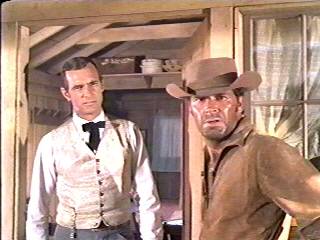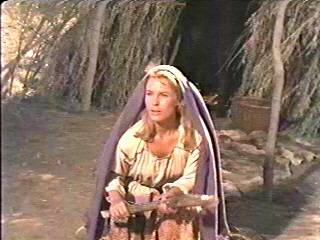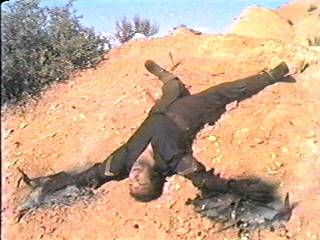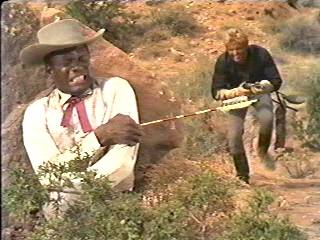
|
|
|
|
|
|
|
|
|
|
|
|
|
(1966) Director: Ralph
Nelson
I was first introduced to Duel At Diablo years ago as a small child, during one particularly lazy weekend when I turned on the TV and happened to come across it around the halfway point. Though plenty of times in the past I had come across a western on TV and flipped to another channel after several minutes, this time I didn't do so. Though I didn't know why at the time, there was something about what I was watching that I found captivating, and as the movie progressed I became more and more engrossed with the events being shown, and I ended up watching it until the very end. By then, a number of striking images from the movie had filled my mind, images that I never forgot as the years went by and I became older. And despite all that time having those images as clear in my mind as the day I saw them, all my sporadic attempts to find out the title of the movie during that time were equally fruitless. It was not until the Internet came around and I got access to it that I was able to track down the title once and for all. And unlike the times many of us have revisited a childhood favorite movie and found it a disappointment, I found my revisit of Duel Of Diablo just as captivating as that day many years ago. It's one of my favorite westerns. Now, I wouldn't say it's one of the best westerns ever made - it has some flaws even I find more than worthy of criticism - but what it gets right it gets right beautifully, all put together generating a magnetism that pulls you along even though the rough patches. The tone of the movie is immediately set when the blade
of a knife rips through the black backdrop of the opening credits,
combined with the Jesse doesn't pursue an answer to these puzzling questions, possibly because he himself has been harboring a big painful secret for over a year, one still to this day torturing to the point that we see him almost kill a man over a remark just about anyone else would think was an innocent one. His problem (as well as anyone else's) is temporarily put aside when he is approached by his old friend Lieutenant McAllister (Bill Travers of Born Free) with an urgent request to be a scout for an upcoming patrol with a platoon full of green recruits. Jesse reluctantly takes the job, only because there is something about it that may give him the opportunity to end his anguish. However, he is not the only member of the party to be unhappy to be there. McAllister is furious that his superior officer has forced him to let Willard's supply wagon train tag along, slowing down and further endangering the patrol. Equally unhappy is former army sergeant Toller (Poitier), who finds he must accompany the patrol if he's to finish breaking all the horses he was contracted to do if he's to get the money he needs to start his own gambling hall. The fact that he and McAllister have had a number of disagreements over protocol in their years working together just adds to the tension. Add to the fact that Ellen runs away again into the desert just before the patrol moves out, plus that word is out about a nearby renegade band of Apaches that broke out of their reservation - and that the chances of slipping by them undetected is next to zero - it's a certainty that sometime along the way, order will swiftly crumble into chaos. Duel At Diablo has a remarkably
different tone from earlier American westerns, even those made just
earlier in the decade. Even in this more cynical time that we currently
live in, many people will be struck by its frequently harsh tone. Much Though the screenplay plays a large part in making these characters both multi-layered and compelling, it's the cast that really makes them come alive. Those who are more familiar with James Garner in easygoing roles like Jim Rockford will see from this atypical role that he has a far greater acting range, not just by how he reads his lines in order to be convincing as a hardened wanderer who has no hesitation to kill. There are several sequences where his character is silent but shows his feelings through his face, and it's quite astonishing how effective Garner is at this, especially in the scene where Jesse opens the leather bag - it has the effect of a punch to the stomach. Speaking of great scenes, the solid Dennis Weaver has one himself where his character's feelings towards his wife make several instant 180 degree turns in just a couple of minutes of conversation with her - a challenge for any actor to make convincing, yet Weaver does so with seemingly little effort. The other players are equally up to their parts. Poitier gives his character the intelligence, confidence, and dignity needed to make it believable Toller could be a major player in all of this, and to remind us of the forgotten fact that blacks made major contributions to the settlement of the west. Interestingly, Toller's ethnicity is never brought up at any point of the movie. Andersson and Travers also give it their very best, but
unfortunately they are hampered by their personal ethnic backgrounds.
That is, with their accents, which despite their great efforts still
manage to peek through every now and then. Curiously, Andersson hides
her Swedish accent better than Travers hides his British accent. On the
other hand, Travers' character gets to do a lot more than Andersson's,
which is kind of strange when it's eventually Though the screenplay has some glaring weaknesses, it is partially compensated by the exceedingly professional and flavorable direction, giving us something to chew on the occasion the writing is lacking. One of the aspects of Duel Of Diablo that will strike viewers almost immediately is how much the movie resembles a spaghetti western. Though the spaghetti western had not yet fully penetrated the United States, it is clear that even in 1966 the genre was starting to influence American directors. The specific southern Utah locations (which are so gorgeously photographed that the colors almost burst from the screen) greatly resemble many of the Spanish locations spaghetti western directors were using at the time. And while the Neal Hefti score (both epic and haunting) would probably not be mistaken as one composed by a European, sharp-eared audience members will hear an undeniable spaghetti western influence, such as with Hefti's use of guitars. Undoubtedly another big influence is with the handling of the violent content. Not only is there an angry feeling to Duel At Diablo, but there is a harsh and violent one as well. Though the movie doesn't go all-out in its depiction of violence (the production code still hadn't been lifted), it is still incredibly brutal, including such things as attempted gang rape and prolonged torture. Remarkably, despite the amount of violent content it
has, the movie never once glamorizes it. When Jesse takes on four or
five guys in a massive brawl, you sense his agony with every blow he
takes, and his building exhaustion as he struggles to finish the job.
Whenever the Apaches and the cavalry take on each other, the
Check for availability on Amazon (VHS) See also: Cheyenne Warrior, The Stalking Moon, Survival Run |
 subsequent first shot of the actual movie,
which consists of the sight of cowboy drifter Jesse Rensberg (Garner)
stumbling across the gruesome remains of a man brutally tortured by
Apaches. Things don't get any brighter from that discovery on, not even
shortly afterwards when Jesse sees a straggler in the desert being
pursued by Apaches, and he jumps in to the rescue with his rifle
blazing. It turns out that the stranger - a woman named Ellen (Ingmar
Bergman favorite Bibi Andersson) - didn't want to be rescued,
for reasons she is keeping to her own. Then when Jesse makes a noble
act by escorting her back to the town of Creel, Jesse not only
discovers the townspeople consider her more something to gawk at than
celebrate her return, her own husband Willard (Dennis Weaver, who was
the star of another "duel" movie several years later) is completely
indifferent to her return, expressing more regret over the fact that
the horse she was riding on is now dead.
subsequent first shot of the actual movie,
which consists of the sight of cowboy drifter Jesse Rensberg (Garner)
stumbling across the gruesome remains of a man brutally tortured by
Apaches. Things don't get any brighter from that discovery on, not even
shortly afterwards when Jesse sees a straggler in the desert being
pursued by Apaches, and he jumps in to the rescue with his rifle
blazing. It turns out that the stranger - a woman named Ellen (Ingmar
Bergman favorite Bibi Andersson) - didn't want to be rescued,
for reasons she is keeping to her own. Then when Jesse makes a noble
act by escorting her back to the town of Creel, Jesse not only
discovers the townspeople consider her more something to gawk at than
celebrate her return, her own husband Willard (Dennis Weaver, who was
the star of another "duel" movie several years later) is completely
indifferent to her return, expressing more regret over the fact that
the horse she was riding on is now dead. of this comes from
the fact that practically every character who has some bearing on the
plot is angry for one reason or another, and we are constantly
reminded of this by the frequent fury-laced arguments and outbursts of
these individuals. But this harsh tone doesn't turn us away, because
although these characters may do or say things we don't approve of, the
movie takes the time to let us see them in more than one way. Jesse may
be a hothead who doesn't always think before making an action, but we
soon learn he experienced a horrific tragedy, one so large that it
might drive anyone to act like him. And he does realize at times the
wrongness of some of his actions, such as not longer after almost
killing that man. Willard at first may seem to be a cruel and unloving
husband, but we do soon get to see that despite his cold facade he does
still love her very much. When we subsequently
learn of the tragedy he and Ellen were struck by, and when you consider
the place and ideals of the time, you have an understanding why he
treats Ellen so badly even while disapproving of his actions. Even the
rampaging Apaches are given an even-handed treatment. At one point,
Jesse lectures McAllister that the army just has itself to blame for
the Apaches going on the warpath, after being pushed too hard and for
too long. McAllister yells back, "It cuts both ways!" and reminds Jesse
of the innocent women and children tortured and murdered, and asks if
the Apaches are justified to do that.
of this comes from
the fact that practically every character who has some bearing on the
plot is angry for one reason or another, and we are constantly
reminded of this by the frequent fury-laced arguments and outbursts of
these individuals. But this harsh tone doesn't turn us away, because
although these characters may do or say things we don't approve of, the
movie takes the time to let us see them in more than one way. Jesse may
be a hothead who doesn't always think before making an action, but we
soon learn he experienced a horrific tragedy, one so large that it
might drive anyone to act like him. And he does realize at times the
wrongness of some of his actions, such as not longer after almost
killing that man. Willard at first may seem to be a cruel and unloving
husband, but we do soon get to see that despite his cold facade he does
still love her very much. When we subsequently
learn of the tragedy he and Ellen were struck by, and when you consider
the place and ideals of the time, you have an understanding why he
treats Ellen so badly even while disapproving of his actions. Even the
rampaging Apaches are given an even-handed treatment. At one point,
Jesse lectures McAllister that the army just has itself to blame for
the Apaches going on the warpath, after being pushed too hard and for
too long. McAllister yells back, "It cuts both ways!" and reminds Jesse
of the innocent women and children tortured and murdered, and asks if
the Apaches are justified to do that. revealed what
happened to her character and how it ties into the critical situation
that eventually brews up; afterwards she is pretty much pushed into the
background and not given anything of significance to do for the rest of
the movie. An even bigger disappointment is with the handling of Chata
(horror actor John Hoyt), the leader of the Apache band. Despite being
the main adversary of the other characters, incredibly he's not given
that much screen time at all, and it's made more disappointing by the
fact that in his few scenes you see such potential for this character.
These are not the only instances where the screenplay has been notably
underwritten. Throughout the movie there are indications that Jesse may
be falling in love with Ellen, but this subplot goes nowhere and ends
up simply being abandoned before the end. Equally mishandled is the
subplot concerning Jesse's tortured secret and his newly-made plan to
finally bring a resolution to the issue once and for all. After the
main situation the chief characters find themselves in is set up and
put forth into motion, the subplot is then forgotten about until about
the last ten minutes of the movie. The movie then tries to desperately
pump up this subplot's tension so that it will end in a bang, but then
suddenly it deflates completely in a blink of an eye so that it instead
ends with a whimper. Then when the closing credits start a few minutes
later, you can't help but wonder why the subplot was in the movie in
the first place, since removing it wouldn't have altered the main plot
or characters in any real way.
revealed what
happened to her character and how it ties into the critical situation
that eventually brews up; afterwards she is pretty much pushed into the
background and not given anything of significance to do for the rest of
the movie. An even bigger disappointment is with the handling of Chata
(horror actor John Hoyt), the leader of the Apache band. Despite being
the main adversary of the other characters, incredibly he's not given
that much screen time at all, and it's made more disappointing by the
fact that in his few scenes you see such potential for this character.
These are not the only instances where the screenplay has been notably
underwritten. Throughout the movie there are indications that Jesse may
be falling in love with Ellen, but this subplot goes nowhere and ends
up simply being abandoned before the end. Equally mishandled is the
subplot concerning Jesse's tortured secret and his newly-made plan to
finally bring a resolution to the issue once and for all. After the
main situation the chief characters find themselves in is set up and
put forth into motion, the subplot is then forgotten about until about
the last ten minutes of the movie. The movie then tries to desperately
pump up this subplot's tension so that it will end in a bang, but then
suddenly it deflates completely in a blink of an eye so that it instead
ends with a whimper. Then when the closing credits start a few minutes
later, you can't help but wonder why the subplot was in the movie in
the first place, since removing it wouldn't have altered the main plot
or characters in any real way. battles may be epic in scale, but
nobody stands out and looks good. We see both sides crumble from
well-formed squads to mass chaos, where every man finds he can only
rely on himself, and not even the best warrior will be able to find and
stay in a superior position. As the body count quickly piles up for
both the Apaches and the cavalry, all you can think about is the utter
waste of life happening here, and you question just how did things end
up with men savagely fighting each other to the death. Nobody ends up
looking better than anyone else, a theme that continues even at the end
when every situation gets resolved. If anything, the movie has a
message of anti-violence, showing that there really isn't a
winner when it comes to war and violent conflict - everyone suffers.
It's a powerful message, and a powerful sight to see these characters
needlessly suffer. That's probably why Duel At Diablo stuck
in my mind all of these years, and no doubt it will linger with you
long after you see it.
battles may be epic in scale, but
nobody stands out and looks good. We see both sides crumble from
well-formed squads to mass chaos, where every man finds he can only
rely on himself, and not even the best warrior will be able to find and
stay in a superior position. As the body count quickly piles up for
both the Apaches and the cavalry, all you can think about is the utter
waste of life happening here, and you question just how did things end
up with men savagely fighting each other to the death. Nobody ends up
looking better than anyone else, a theme that continues even at the end
when every situation gets resolved. If anything, the movie has a
message of anti-violence, showing that there really isn't a
winner when it comes to war and violent conflict - everyone suffers.
It's a powerful message, and a powerful sight to see these characters
needlessly suffer. That's probably why Duel At Diablo stuck
in my mind all of these years, and no doubt it will linger with you
long after you see it.